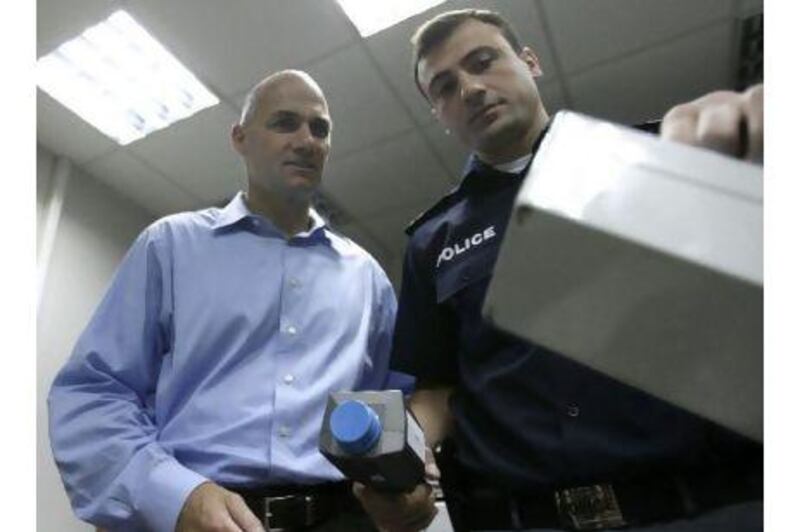WASHINGTON // Early one morning in March, two Armenians slipped aboard a train in the Georgian capital of Tbilisi, unaware they were being watched. They removed a pack of Marlboro cigarettes hidden in a maintenance box between two cars. Inside the pack, Georgian authorities say, was nuclear bomb-grade uranium, encased in lead.
Before long, Georgian officials seized the uranium and arrested the men, breaking up a ring they say was willing to sell material for nuclear weapons to any bidder. International officials see the operation as one victory in the effort to prevent nuclear weapons from falling into the hands of terrorists.
The seizure was reported in April, but few details were disclosed. Now more information from Georgian officials has been released about an operation involving international smugglers and undercover agents. Some elements were confirmed by UN and US officials.
Though this seizure involved, as in previous cases, a small amount of nuclear material, international nuclear safety officials are not reassured. A terrorist organisation could accumulate material from numerous small acquisitions over time. And if small amounts can be smuggled and sold, larger batches could follow similar routes.
"The dangerous thing is that there might be more material out there somewhere," said Archil Pavlenishvili, the chief of Georgia's nuclear smuggling unit in the interior ministry. "This proves that if a criminal or an extremist is wealthy enough, it is possible to obtain material."
According to the account Mr Pavlenishvili and other Georgian officials gave, the investigation began with a tip from an informant.
The man, an ex-smuggler from a village near the Black Sea coast city of Batumi, was once involved in selling fake radiological materials. He told Georgian authorities he had infiltrated a network of smugglers and had learned of an Armenian man trying to sell "serious" nuclear material.
The Armenian, investigators learned, was Sumbat Tonoyan. Once a dairy factory owner, he had lost a fortune gambling and turned to smuggling. Authorities had photos of him taken at border crossings on trips to Turkey.
An undercover agent contacted Tonoyan about the nuclear material, saying only he was from "a significant organisation". In a meeting in Tbilisi, Tonoyan wanted more information but was told: "It is not your business. I am not asking you your name, please don't ask mine. If you want to do business, let's do business."
Tonoyan first demanded more than US$8 million (Dh29.4m) for 120 grams of uranium - a fraction of the amount needed for a bomb.
In a second meeting, he came down to about $1.5m in US bills. Mr Pavlenishvili says smugglers usually settle below $10,000 a gram for bomb-grade material. The mere existence of a typical black market price is a worrisome sign of the supply and demand in the illicit trading of nuclear materials.
Tonoyan suggested he had even more uranium to sell. The buyer was told to expect him in Tbilisi in early March.
Georgian police responded after being alerted early on March 11 that Tonoyan and a companion had crossed the border in a taxi. The companion was later identified as Hrant Ohanian, a retired nuclear physicist from a science institute in Armenia.
Georgian police tailed the taxi. The men got out near a hotel and began casing the deserted street. They appeared concerned they were being watched.
The men then met the train from Yerevan, the Armenian capital, and picked up the cigarette pack containing the uranium. During interrogations, the men would explain they had boarded the train in Yerevan, stashed the uranium and got off before the border crossing.
Authorities had not anticipated that the uranium would cross the border separately from the smugglers. So the uranium moved unaccompanied and unsecured for hours until the men picked it up at the station.
Tonoyan switched the meeting place to the hotel he had cased. He met the undercover buyer in a room. When the men pulled out the sample, a radiation detection device hidden on the undercover agent went off. He said a code word. Agents listening in burst in with a commando team.
The uranium was only 18 grams, less than an ounce. But it had been highly enriched, to almost 90 per cent, high enough for use in a nuclear weapon. It did not pose a radiological risk to anyone who came upon it in transit.
Georgian officials said yesterday that Ohanian and Tonoyan have pleaded guilty after a closed hearing and agreed to cooperate with police. They face at least 10 years in prison.
Radiation detectors on the Georgia-Armenia border under a US programme apparently failed to pick up the uranium hidden in the cigarette pack. Mr Pavlenishvili said Ohanian correctly predicted that the lead casing would conceal the uranium from the detectors. A larger quantity might have been detected.
Georgian and international investigators still are trying to determine the origins of the uranium.






